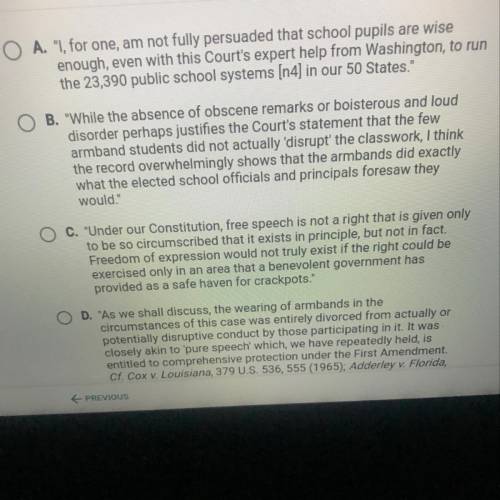Which excerpt from Tinker V. Des Moines shows how precedent helps support an argument?
...

English, 16.11.2020 21:30 kell22wolf
Which excerpt from Tinker V. Des Moines shows how precedent helps support an argument?


Answers: 1


Other questions on the subject: English

English, 21.06.2019 23:30, serenityarts123
1. at the conclusion of chapter 13, the monster realizes that he has none of the qualities or possessions that human beings value, and so he worries the he will be forever miserable. he says, “oh, that i had for ever remained in my native wood, nor known nor felt beyond the sensations of hunger, thirst, and heat! ” this statement recalls one made by victor frankenstein in chapter 10: “if our impulses were confined to hunger, thirst, and desire, we might nearly be free; but now we are moved by every wind that blows, and a chance word or scene that that word may convey to us.” questions: what do these two statements suggest about the impact of knowledge? how do the statements affect the way readers view the monster and victor?
Answers: 1

English, 22.06.2019 01:00, brittneeyy
30 points and brainliest what can you surmise about keats’s theories of art by reading “ode on a grecian urn”? no multiple choice
Answers: 1

English, 22.06.2019 01:50, jurnee77
Plagiarism quiz read both the paragraph below and the information following it that identifies the source using the american psychological association format. then read each of the numbered statements and determine if each is plagiarized or not. circle “yes” if the statement is plagiarized, “no” if it is not, and then fix the “yes” answers). original source the presence of the taiwanese on everest was a matter of grave concern to most of the other expeditions on the mountain. there was a very real fear that the taiwanese would suffer a calamity that would compel other expeditions to come to their aid, risking further lives, to say nothing of jeopardizing the opportunity for other climbers to reach the summit. but the taiwanese were by no means the only group that seemed egregiously unqualified. camped beside us at base camp was a twenty-five-year-old norwegian climber named peter neby, who announced his intention to make a solo ascent of the southwest face, one of the peak’s most dangerous and technically demanding routes—despite the fact that his himalayan experience was limited to two ascents of neighboring island peak, a 20,274-foot bump that required little more than vigorous walking. krakauer, j. (1998). into thin air: a personal account of the mount everest disaster. new york: anchor books, 122 - 3. student samples yes 1. there was a very real fear that the taiwanese would suffer a calamity that would compel other expeditions to come to their aid(krakauer, 1998). no) 2. many climbers overestimate their abilities, as krakauer (1998) explains when he writes of peter neby, whose himalayan experience in the past “required little more than vigorous walking” (122 - 3). no 3. jon krakauer (1998) discusses other concerns besides those of unpredictable weather and his own climbing group’s capabilities. for example the existence of a taiwanese group on everest was a matter of serious unease to most everyone else on the mountain. yes/no 4. krakauer (1998) states that the taiwanese group was not the only inexpert climbers to attempt mt. everest: camped beside us at base camp was a twenty-five-year-old norwegian climber named peter neby. . [whose] himalayan experience was limited to two ascents of neighboring island peak, a 20,274-foot bump that required little more than vigorous walking (122 – 3). yes/no 5. the author asserts that the taiwanese “were by no means the only group that seemed egregiously unqualified.” yes/no 6. in his book into thin air, jon krakauer (1998) discusses many of the dangers he noted prior to his disastrous attempt to climb mt. everest in 1996. among them were encounters with other groups and individual climbers who were ill-trained and ill-equipped to handle the demands of such a climb.
Answers: 2

English, 22.06.2019 05:10, 25linm
Question 9 (5 points) dother, the evil, hated everything. dian, the violent, was a walking nightmare, leaving a bevy of victims wherever he traveled. what does the underlined word mean in the above quote from the legend of carman? a)a small number b)very few c)a minuscule amount d)a large number
Answers: 1
You know the right answer?
Questions in other subjects:


Arts, 09.06.2021 17:50

Mathematics, 09.06.2021 17:50

Geography, 09.06.2021 17:50

Social Studies, 09.06.2021 17:50








